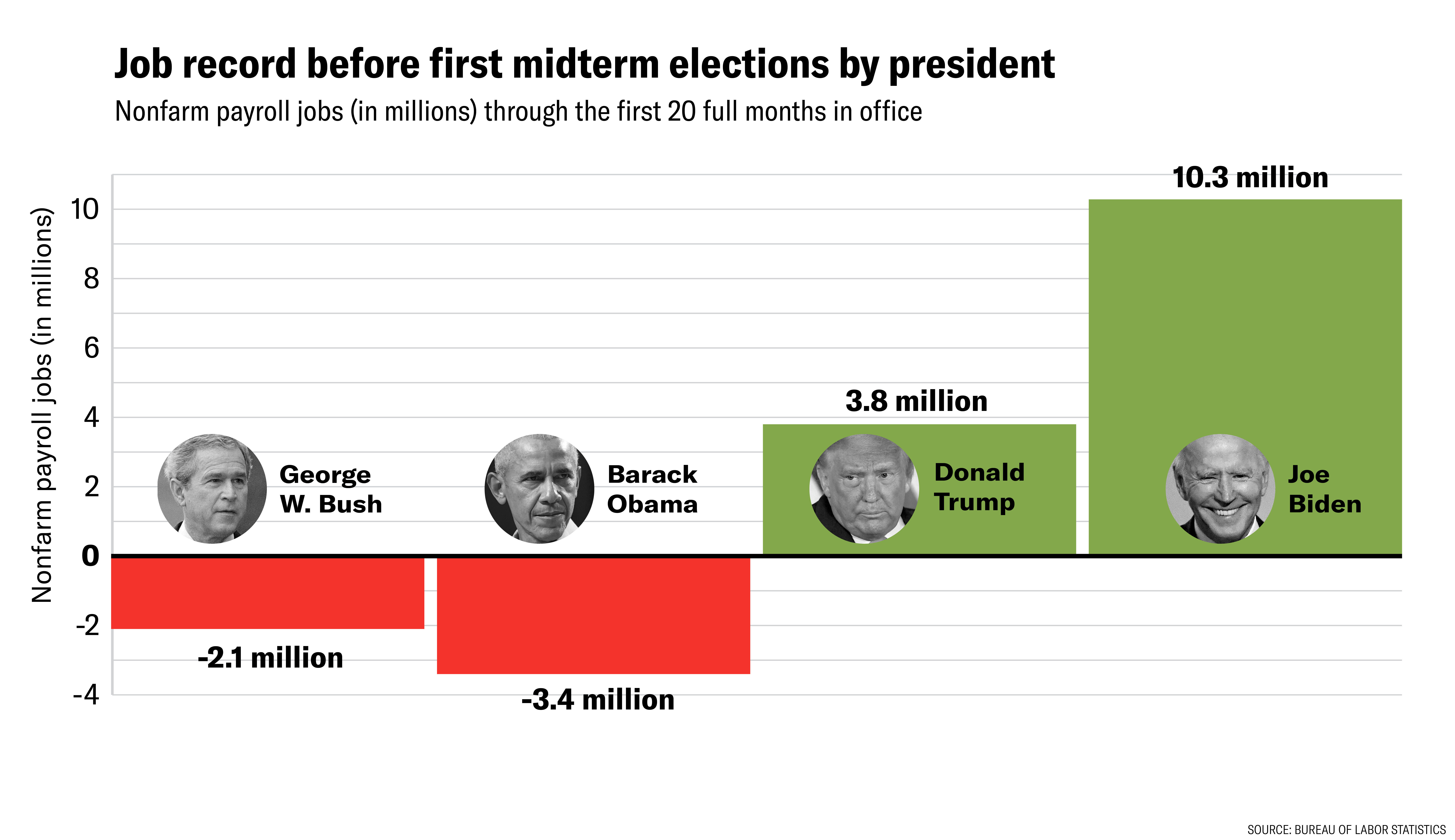Friday’s employment report is the final one before President Joe Biden faces his first midterm elections. Here is how his job record stacks up with those of recent presidents.
The economy added 261,000 jobs in October, a healthy number that shows the country’s labor market is resilient despite the Federal Reserve’s effort to cut inflation through aggressive interest rate hikes.
With that number locked in, it means that since the February after Biden was sworn in last year, some 10.3 million jobs have been created. That is a higher number than all of the recent modern presidents — a reflection of the fact that Biden took over as the economy was roaring back after the coronavirus pandemic.

Biden’s job record began when many people were still out of work because their employers were closed or because they were eschewing jobs for fear of contracting the illness. Much of the job creation since then reflects businesses reopening and workers returning to employment.
During the time President George W. Bush was sworn in through the October before his first midterm election, 2.1 million jobs were lost. The economy was in the throes of a recession brought on by the collapse of the dot-com bubble and the 9/11 terrorist attacks.
HIGH INFLATION AND FEAR OF RECESSION PUT GOP IN POSITION TO TAKE OVER GOVERNMENT
President Barack Obama was similarly sworn in at a time of economic upheaval. The Great Recession began about a month before he was sworn in, and his first two years featured declines in the labor market. In the time leading up to Obama’s first midterm elections, 3.4 million jobs were lost, although the economy had already begun recovering.
Unlike Bush and Obama, President Donald Trump’s first stretch before the 2018 midterm elections was marked by an economic expansion. A total of 3.8 million jobs were added through the October before the election.
Why voters disapprove of Biden on the economy: On its face, Biden’s relatively strong record on jobs is hard to square with voters’ negative perceptions about the economy and his economic stewardship.
But the disconnect can be explained by the historically high inflation hurting household budgets. Inflation has been running at the fastest pace in decades — an 8.2% annual rate in September, according to the consumer price index.
Wages have not kept pace, meaning that workers have seen their inflation-adjusted earnings fall on Biden’s watch. Median weekly earnings have fallen more than 3% since Biden took office, when inflation is taken into account, according to the Bureau of Labor Statistics.
In other words, workers are getting paid more dollars, but they are also being forced to spend much more of that money to purchase the same goods they did before Biden entered the Oval Office.
Voters generally blame Biden and Democrats for inflation. Rounds of fiscal stimulus caused the economy to grow quickly, as people were flush with money and spending on a variety of goods and services. The trade-off for that demand (and weakened supply chains) was explosive inflation, which the Federal Reserve is now trying to rein in via higher interest rates.
A recent poll conducted for Newsweek by Redfield & Wilton Strategies found that a whopping 61% of voters believe Biden and his policies are either “significantly” or “fairly” responsible for inflation.
CLICK HERE TO READ MORE FROM THE WASHINGTON EXAMINER
Where the jobs are coming from: Some sectors have performed better than others since Biden took office.
For instance, jobs in the leisure and hospitality space have ballooned by more than 3 million since February of last year. That’s because restaurants and hotels suffered the worst of the pandemic, hit by restrictions imposed by governments, as well as a hit to demand as many of their customers avoided public spaces. As Biden took office, people resumed dining out and traveling, and eateries and bars began rehiring workers.
Meanwhile, the mining and logging sector, a category that encompasses energy workers, has gained only 88,000 workers.
The financial sector, too, has lagged, adding only 239,000 jobs during Biden’s tenure, just a 2.7% increase.
Rising mortgage rates (which have exploded as a result of the Fed’s tight monetary policy) have made housing much less affordable and have blunted construction growth. Some 361,000 jobs in the construction sector have been added since Biden took office.
